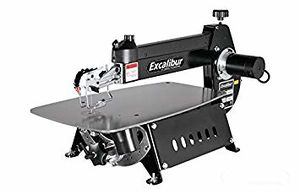Difference between revisions of "Scroll Saw"
| Line 13: | Line 13: | ||
|Has make=Excalibur | |Has make=Excalibur | ||
|Has model=EX-21 | |Has model=EX-21 | ||
| + | |Has serial number=EX2100170900211 | ||
|Has ace=Needed;Needed | |Has ace=Needed;Needed | ||
}} | }} | ||
[[{{#show: {{FULLPAGENAME}}|?Has icon|link=none}}|100px|left|top|{{#show: {{FULLPAGENAME}}|?Has icondesc}}]] | [[{{#show: {{FULLPAGENAME}}|?Has icon|link=none}}|100px|left|top|{{#show: {{FULLPAGENAME}}|?Has icondesc}}]] | ||
| + | [[{{#show: {{FULLPAGENAME}}|?Has image|link=none}}|300px|thumb|upright=1.5|{{#show: {{FULLPAGENAME}}|?Has imagedesc}}]] | ||
| + | |||
| + | Make: {{#show: {{PAGENAME}} |?Has make}} | ||
| + | |||
| + | Model: {{#show: {{PAGENAME}} |?Has model}} | ||
| + | |||
| + | Serial Number: {{#show: {{PAGENAME}} |?Has serial number}} | ||
| + | |||
| + | Ace: {{#show: {{PAGENAME}} |?Has ace.Has name}} ({{#show: {{PAGENAME}} |?Has ace.Has email address}}). | ||
| + | |||
| + | Location: {{#show: {{PAGENAME}} |?Is located in facility}} | ||
| + | |||
[[File:Excalibur EX21 Scroll Saw Image.jpg|thumb|Excalibur EX-21 Scroll Saw]] | [[File:Excalibur EX21 Scroll Saw Image.jpg|thumb|Excalibur EX-21 Scroll Saw]] | ||
Revision as of 15:36, 31 July 2020
Make: Excalibur
Model: EX-21
Serial Number: EX2100170900211
Ace: Needed (Makerhub@georgefox.edu).
Location: Wood Shop
The Excalibur EX-21 Scroll Saw is a small variable speed electric saw. It operates similarly to a band saw, but uses a reciprocating blade instead of a loop. This reciprocation means the blade does not cut continuously and only on the down stroke. The thinness of the blade allows it to be turned in the work piece at an almost 90 degree angle, which allows the blade to track along fine detail and sharp lines. The blade can also be removed on either the top or bottom of the reciprocating arm which allows the blade to be inserted inside of a work piece without needing an entry cut, the only thing necessary is a small hole drilled through the material. There is a blade guard and a dust blower nozzle that both need to be adjust before a piece can be cut into the material.
The current Ace of the Scroll Saw is Needed (Makerhub@georgefox.edu).
Description
The scroll saw is simple machine with an oscillating blade. The thin shallow blade has a very narrow kerf and allows the user to cut fine details and sharp corners. There are a variety of blades available for various types of materials and cuts. Some of the scroll saw uses include wood puzzle making, intarsia projects, and dovetail cutting. The blade can also be removed and inserted into a drilled hole to give access to the center of an island area in material to cutout the center of an "O" for example. A paper template with a design can be glued onto the top of a work piece and traced.
Here is an example of this piece of equipment being used.
Documentation
Terminology
- Material hold down - Adjustable metal bar that sits above work piece used to help keep material from lifting off the table.
- Kerf - The material removed by the width of the blade.
Training
Operation
The scroll saw has an oscillating blade with a variable speed control. The thin narrow blade allows you to make tight turns and produce very detailed cuts.
The cutting angle of the scroll saw can be changed by doing the following:
1. Release the locking lever by rotating it counter-clockwise.
2. Turn the tilting handle left or right as desired.
3. Use the spring loaded indexing pin for common angles.
4. Tighten the locking lever.
Demonstration
Demonstrate you can safely setup and operate the scroll saw. You will sketch a letter on a piece of scrap using a pen or pencil. You will follow the lines with the blade and cut out the letter. Keep your fingers away from the blade.
General Procedure
1. Obtain a piece of wood roughly 4" x 4". If the work piece is too small it will be difficult to hold onto.
2. Using a pencil or pen sketch a letter without a isolated center.
3. Make sure to tension the blade by flipping the blade tension lever. If the blade is not tensioned properly the blade cut will tend to drift and will make it difficult to follow the cut lines.
4. Adjust the height of the hold down and blade guard for the thickness of material you are using.
5. Make sure the air blow-off nozzle is pointing at location in front of the blade. This will remove dust from the cut lines and make it easier to follow your lines.
6. Make sure the material is clear of the blade and turn on the power switch.
7. Using the blade speed adjustment knob you can set the blade strokes per minute. The EX-21 is capable of producing 400 to 1550 strokes per minute. Normally harder/thicker material will require a slower blade speed. Set the blade around 800 to start with. If you notice burn marks slow down the speed.
8. Gently feed the material into the blade while aligning your marks with the blade. Slowly follow the line with the blade and cutout around the letter.
9. Adjust the blade oscillation speed as needed. If the material is showing burn marks you need to slow down the speed.
10. When you finish cutting out the letter turn off the power switch.
11. Detention the blade by flipping the lever above the blade.
12. Reset the space.
Safety
There are several hazards you need to be aware of when using a scroll saw.
- Keep your fingers and hands away from the blade and all moving parts.
- If a blade breaks or gets pulled from the holder turn off the machine and tell the supervisor.
- Always wear proper safety equipment to prevent injury.
- Some woods can create toxic dust so be aware of what you are cutting.
- Hold onto material firmly as the blade will try to lift the material off the table.
- Use a brush to clear away chips and sawdust.
- Allow the blade to do the cutting at its own speed. Don't force material into the blade.
- Make sure the material hold down is correctly adjusted. The hold down should never impede the material movement and should barely sit above the material.
Certification
Troubleshooting
If the blade pulls out of the holder, stop the machine and contact the supervisor. Over tightening the blade holder will damage the threads.
Maintenance
General maintenance
There are several items on the machine that will need attention over time.
- Every 10-15 hours of use, the blade tension lever should be lubricated.
- The blade may need to be squared up to the table if it gets out of adjustment.
- The upper arm adjustment screw will need to be adjusted if the upper arm will not stay in the upright position.
- If the blade slips in the holder frequently it is time to change the blade clamp thumb screw.
Specific Maintenance Tasks
| Maintenance Procedure | Frequency | Done By |
|---|---|---|
| Sample | Sample | Sample |

